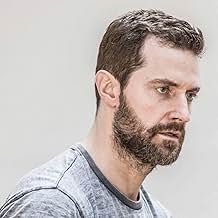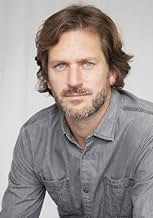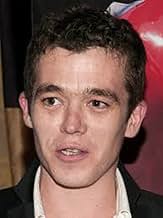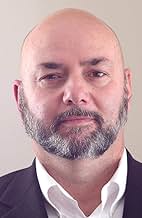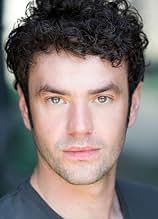AVALIAÇÃO DA IMDb
5,9/10
7 mil
SUA AVALIAÇÃO
Na Irlanda do século 13, um grupo de monges deve escoltar uma relíquia sagrada por uma paisagem repleta de perigos.Na Irlanda do século 13, um grupo de monges deve escoltar uma relíquia sagrada por uma paisagem repleta de perigos.Na Irlanda do século 13, um grupo de monges deve escoltar uma relíquia sagrada por uma paisagem repleta de perigos.
- Prêmios
- 1 vitória e 3 indicações no total
Akilas Karazisis
- The Killer
- (as Akillas Karazisis)
Gaëtan Wenders
- Fournier
- (as Gaetan Wenders)
Avaliações em destaque
Well cast and acted. Visually pleasing and plenty of well performed action. If this is your genre you'll enjoy it
In the early 13th century a group of monks are tasked to transport an ancient holy relic from their remote monastery in Ireland to Rome. They have organised assistance along the way in the form of some French soldiers but events do not pan out in a straightforward way.
This Irish adventure-drama is one which manages to capture its period feel while retaining a contemporary edge. The problem with these types of movies is often the characters spout dialogue which is overly dramatic and false feeling, like a bunch of modern actors pretending to be from medieval times. In this case, it didn't feel like this so much, with performances being universally convincing and understated enough to feel considerably more authentic than is usual. The choice of using different languages of the day assisted in this, with Gaelic, French and English (the latter of which being used as a substitute for Latin, which the film-makers decided could not be spoken naturally nowadays so an artistic compromise was to substitute that for English). The gloomy Irish landscape was very evocative and atmospheric and captured very well cinematically, and like other adventure-dramas like the Amazon films of Werner Herzog, the landscape is to all intents and purposes another character too, given its visual potency. There is an excellent low-key atmospheric score underpinning the imagery and events which serves the tension and drama very well also. The story itself is very minimalistic and straightforward with a quest narrative that actively allows for a variety of different events to unfold, which includes a couple of dynamic action scenes – a brutal and intense ambush in a forest and a finale on a beach. The story is clever enough to allow for a religious interpretation while offering up rationale explanations for all events too. In this way, it has a modern feel to it while playing off the mysteries inherent in the religious side of things. Overall, I found this to be a very compelling bit of work, with a great atmospheric setting and interesting characters. And because it is an Irish production, it does have a more authentically Celtic feel to it, which served the material well.
This Irish adventure-drama is one which manages to capture its period feel while retaining a contemporary edge. The problem with these types of movies is often the characters spout dialogue which is overly dramatic and false feeling, like a bunch of modern actors pretending to be from medieval times. In this case, it didn't feel like this so much, with performances being universally convincing and understated enough to feel considerably more authentic than is usual. The choice of using different languages of the day assisted in this, with Gaelic, French and English (the latter of which being used as a substitute for Latin, which the film-makers decided could not be spoken naturally nowadays so an artistic compromise was to substitute that for English). The gloomy Irish landscape was very evocative and atmospheric and captured very well cinematically, and like other adventure-dramas like the Amazon films of Werner Herzog, the landscape is to all intents and purposes another character too, given its visual potency. There is an excellent low-key atmospheric score underpinning the imagery and events which serves the tension and drama very well also. The story itself is very minimalistic and straightforward with a quest narrative that actively allows for a variety of different events to unfold, which includes a couple of dynamic action scenes – a brutal and intense ambush in a forest and a finale on a beach. The story is clever enough to allow for a religious interpretation while offering up rationale explanations for all events too. In this way, it has a modern feel to it while playing off the mysteries inherent in the religious side of things. Overall, I found this to be a very compelling bit of work, with a great atmospheric setting and interesting characters. And because it is an Irish production, it does have a more authentically Celtic feel to it, which served the material well.
Out of the creeping faerie mist of a dark age comes an intensely suspenseful tale about why we choose our allegiances. This is the heart of the story - our reasons make no sense.
The drama revolves around a lump of rock. That any other lump could replace it at any time and no-one would notice is openly stated in the dialogue. It's the stark question woven through the plot - is faith taken on faith alone really worth fighting for?
It's a tense film, beautifully written and exquisitely acted. Each viewer decides what the film's about - it doesn't explain itself, it falls silent. Everyone will see something different. Some might conclude we're all compelled towards war whether we like it or not. Some might decide we're all in league with the Devil whether we know it or not. Some might believe we're all still lost in the creeping faerie mist clutching for something to save us.
Some reviewers didn't rate it highly as an action thriller but it's not a superficial movie and maybe doesn't fit into that genre. There's far more being shown in the subtext and the themes than being told in the action. As for the excessive violence, I felt it merely conveyed the grim reality of melee combat. After all, hidden in the word 'Pilgrimage' is the word 'grim'.
It's a mark of a brilliant film when after seeing it once you must see it again. On the second viewing, it bit me deeper on the neck and made me more its thrall.
For me, the main highlight was Jon Bernthal's acting. It was haunting. He played a voiceless man who served the monks as the lowliest of their group and I fell in love with his tragic integrity. He reminded me of another tormented anti-hero of contemporary myth - Angel from 'Buffy The Vampire Slayer': the vampire cursed with a soul, plagued by a weight of remorse for a hellish past. Both crave absolution and will do anything to receive it.
I loved 'Pilgrimage'. It was a strangely beguiling hybrid of superstitious medievalism clashing with an ancient landscape alive with pre-existing belief. And the ending was satisfyingly unsatisfying - like all good fairy tales are.
The drama revolves around a lump of rock. That any other lump could replace it at any time and no-one would notice is openly stated in the dialogue. It's the stark question woven through the plot - is faith taken on faith alone really worth fighting for?
It's a tense film, beautifully written and exquisitely acted. Each viewer decides what the film's about - it doesn't explain itself, it falls silent. Everyone will see something different. Some might conclude we're all compelled towards war whether we like it or not. Some might decide we're all in league with the Devil whether we know it or not. Some might believe we're all still lost in the creeping faerie mist clutching for something to save us.
Some reviewers didn't rate it highly as an action thriller but it's not a superficial movie and maybe doesn't fit into that genre. There's far more being shown in the subtext and the themes than being told in the action. As for the excessive violence, I felt it merely conveyed the grim reality of melee combat. After all, hidden in the word 'Pilgrimage' is the word 'grim'.
It's a mark of a brilliant film when after seeing it once you must see it again. On the second viewing, it bit me deeper on the neck and made me more its thrall.
For me, the main highlight was Jon Bernthal's acting. It was haunting. He played a voiceless man who served the monks as the lowliest of their group and I fell in love with his tragic integrity. He reminded me of another tormented anti-hero of contemporary myth - Angel from 'Buffy The Vampire Slayer': the vampire cursed with a soul, plagued by a weight of remorse for a hellish past. Both crave absolution and will do anything to receive it.
I loved 'Pilgrimage'. It was a strangely beguiling hybrid of superstitious medievalism clashing with an ancient landscape alive with pre-existing belief. And the ending was satisfyingly unsatisfying - like all good fairy tales are.
I've gone for this movie with no expectations based on its rating ,, but I was really surprised .. This movie is really Powerful that after its end it would make you think for a while about your convictions or the principles of your beliefs . * maybe not going wrong with them but just questioning *
It discusses things not about religion but particularly the way of Religious speech and people who may control the message of religions in general ( Not Christianity in particular ) and how politics also may affect how things work ..
The acting is very good especially that of Jon Bernthal ( The Mute ) .. The music is well played as well as the picture ,, Great Atmosphere of that period of time ( 13th century ) with bloody violent action scenes which were really well performed
This is my first movie of the director Brendan Muldowney and I think it won't be the last .. Great Job
Overall I liked nearly everything about the movie . If you're interested in that period of time and historical movies , Just go for it ..
It discusses things not about religion but particularly the way of Religious speech and people who may control the message of religions in general ( Not Christianity in particular ) and how politics also may affect how things work ..
The acting is very good especially that of Jon Bernthal ( The Mute ) .. The music is well played as well as the picture ,, Great Atmosphere of that period of time ( 13th century ) with bloody violent action scenes which were really well performed
This is my first movie of the director Brendan Muldowney and I think it won't be the last .. Great Job
Overall I liked nearly everything about the movie . If you're interested in that period of time and historical movies , Just go for it ..
This strong, atmospheric, and beautifully-made little film did not disappoint based on reviews that either put it in the trash for "gratuitous violence" or gave it a firm pat on the head for a good attempt.
I see the value in the latter assessment - working on a budget, this film does a lot with what it has, providing hauntingly beautiful vistas of an ancient Ireland and making its story stretch beyond its small shooting framework. The actors, too, make so much of the script they've been given, with great performances throughout. Although this does lead me onto the main drawback of the film: the characters are largely undeveloped, especially that of Diarmuid - who is the protagonist no less - and his Brothers. We can see that he cares about them a lot - after all, "the monastery is all he's ever known" - but more development would have been crucial to making me really care about whether they lived or died, failed or succeeded. The most interesting characters for me were Geraldus and the Mute, "grey" characters whose backstories are hinted at if never fully disclosed, and with sublime subtlety in the case of Bernthal's character. The characters we do get to truly see are rewarding, albeit darkly, and were one of the film's greatest triumphs - it just would have been great to see the same treatment given to the lead protagonist and primary villain.
In the other camp, I don't think the story could have worked without the levels of violence, savagery, and loss that we see, which the viewer must witness with the same unblinking acceptance that the characters do. In this, there is a hidden depth to Pilgrimage, a story about Ireland, the land where "there was never peace". One review focused around the particular Irishness of the film rang true in some places - that the colour shown here is multiple shades of grey, and little green - if not in others. This is not a deconstruction of the "Irish" mythos, but it does touch, tenderly and reverentially, upon the idea of an unattainable relic: to know peace, both within and without, a dream not limited to this country but echoed in Jerusalem and beyond. Though it does not present its findings in a wholly satisfying parcel, the film did provoke thought about where that quest for peace could lead us next - to what bloody ends or watery graves? To what loss and to what triumphs?
"Where to now?"
I see the value in the latter assessment - working on a budget, this film does a lot with what it has, providing hauntingly beautiful vistas of an ancient Ireland and making its story stretch beyond its small shooting framework. The actors, too, make so much of the script they've been given, with great performances throughout. Although this does lead me onto the main drawback of the film: the characters are largely undeveloped, especially that of Diarmuid - who is the protagonist no less - and his Brothers. We can see that he cares about them a lot - after all, "the monastery is all he's ever known" - but more development would have been crucial to making me really care about whether they lived or died, failed or succeeded. The most interesting characters for me were Geraldus and the Mute, "grey" characters whose backstories are hinted at if never fully disclosed, and with sublime subtlety in the case of Bernthal's character. The characters we do get to truly see are rewarding, albeit darkly, and were one of the film's greatest triumphs - it just would have been great to see the same treatment given to the lead protagonist and primary villain.
In the other camp, I don't think the story could have worked without the levels of violence, savagery, and loss that we see, which the viewer must witness with the same unblinking acceptance that the characters do. In this, there is a hidden depth to Pilgrimage, a story about Ireland, the land where "there was never peace". One review focused around the particular Irishness of the film rang true in some places - that the colour shown here is multiple shades of grey, and little green - if not in others. This is not a deconstruction of the "Irish" mythos, but it does touch, tenderly and reverentially, upon the idea of an unattainable relic: to know peace, both within and without, a dream not limited to this country but echoed in Jerusalem and beyond. Though it does not present its findings in a wholly satisfying parcel, the film did provoke thought about where that quest for peace could lead us next - to what bloody ends or watery graves? To what loss and to what triumphs?
"Where to now?"
Você sabia?
- CuriosidadesTo prepare for his role, Jon Bernthal spent the first few weeks of shooting completely silent, even when he's not on set.
- Erros de gravaçãoTodas as entradas contêm spoilers
Principais escolhas
Faça login para avaliar e ver a lista de recomendações personalizadas
- How long is Pilgrimage?Fornecido pela Alexa
Detalhes
- Data de lançamento
- Países de origem
- Idiomas
- Também conhecido como
- El sacrilegio
- Locações de filme
- Empresas de produção
- Consulte mais créditos da empresa na IMDbPro
Bilheteria
- Orçamento
- € 4.749.500 (estimativa)
- Faturamento bruto mundial
- US$ 23.689
- Tempo de duração
- 1 h 36 min(96 min)
- Cor
- Mixagem de som
- Proporção
- 2.35 : 1
Contribua para esta página
Sugerir uma alteração ou adicionar conteúdo ausente



